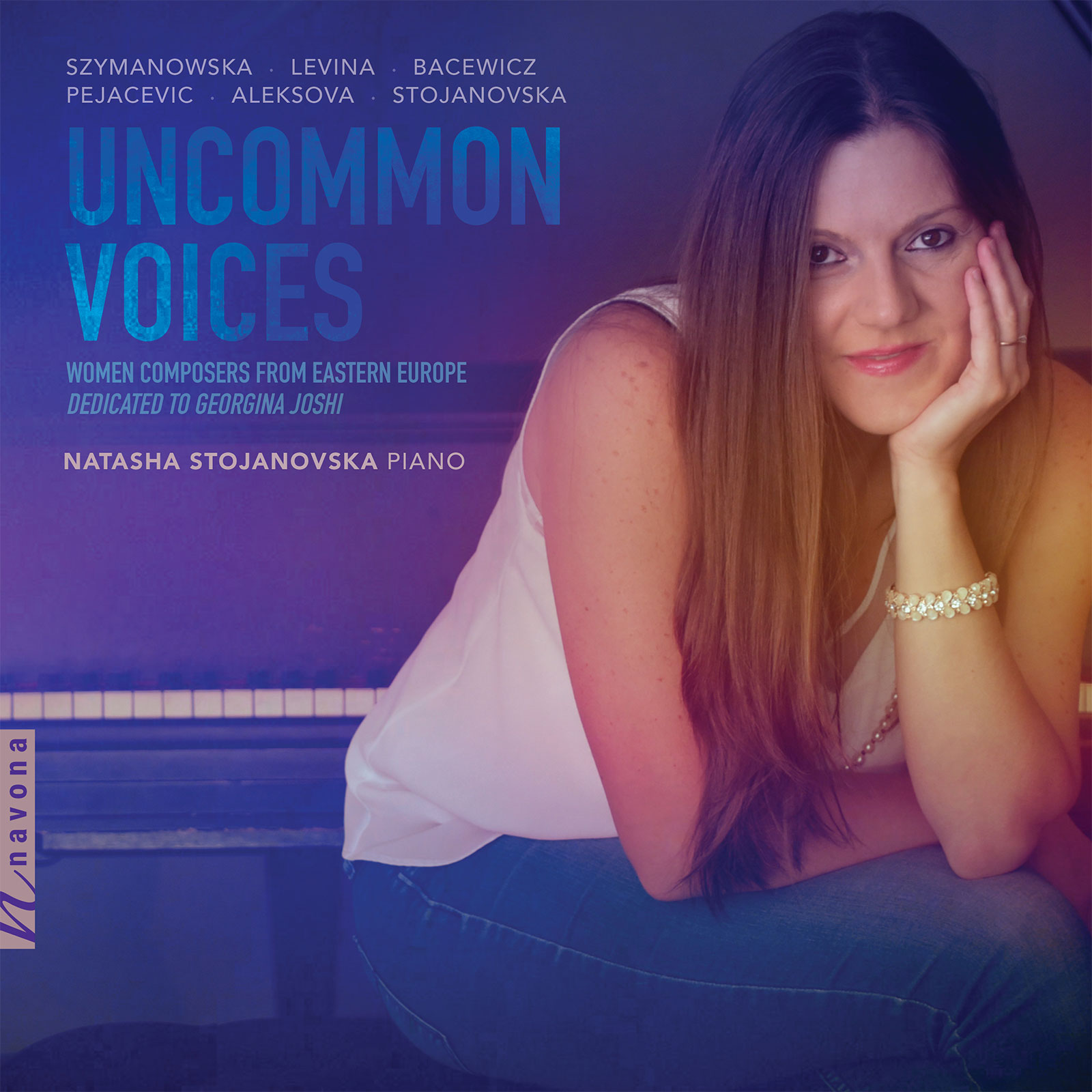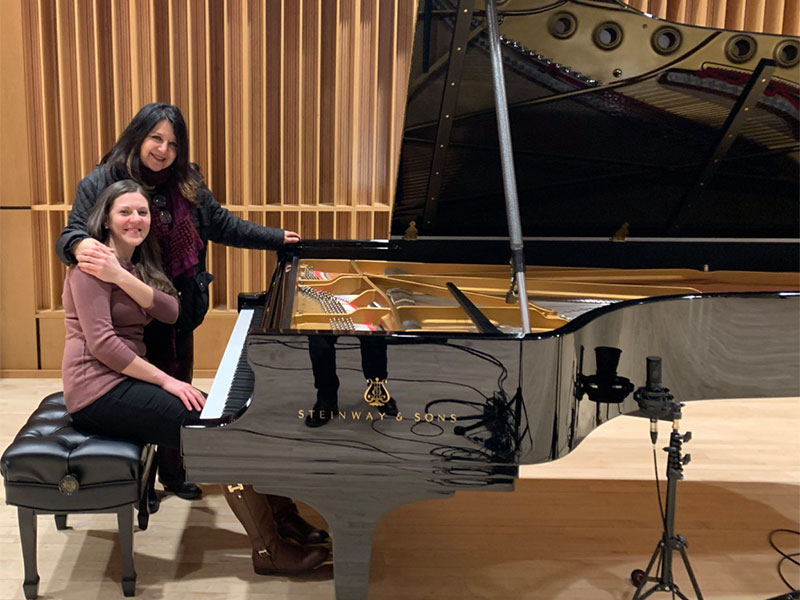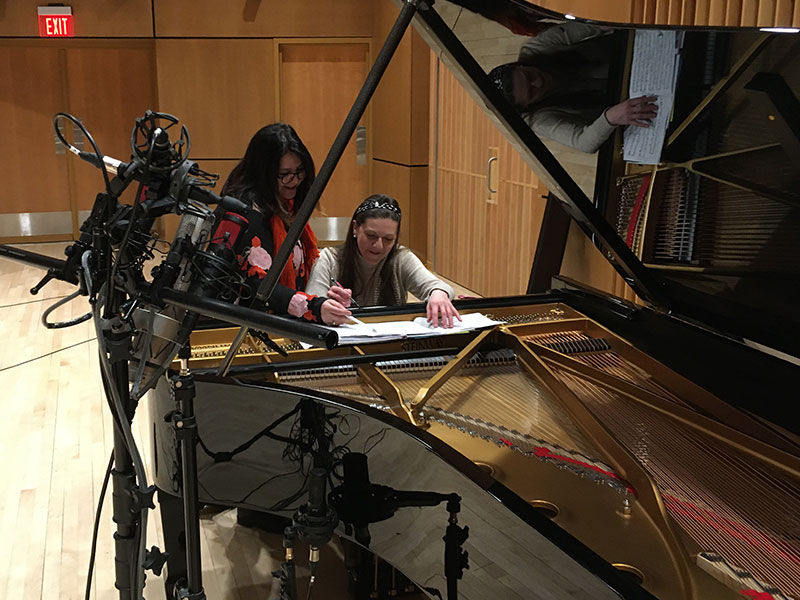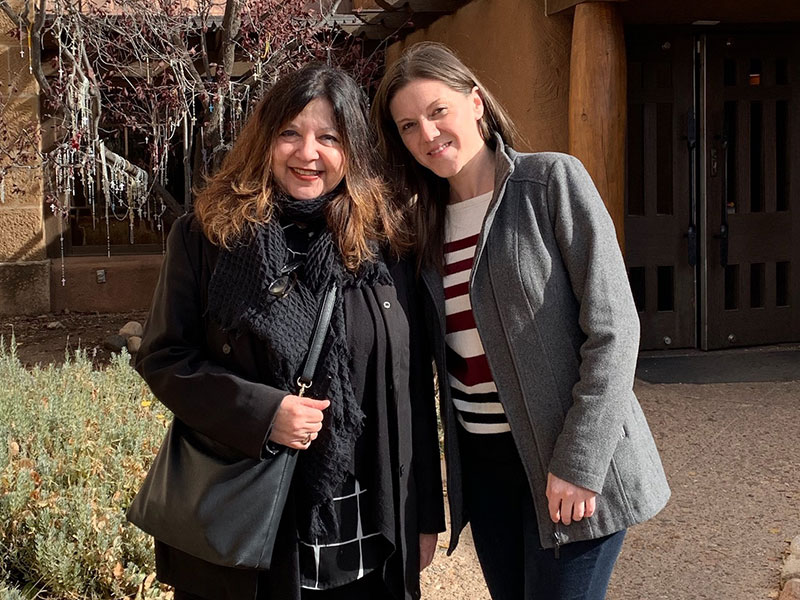Uncommon Voices
Maria Szymanowska composer
Zara Levina composer
Grażyna Bacewicz composer
Dora Pejacevic composer
Bojana Petrovic Aleksova composer
Natasha Stojanovska composer & pianist
UNCOMMON VOICES from Natasha Stojanovska explores the music of female composers from Eastern Europe. This collections of piano works includes the music of Croatia, North Macedonia, the former Soviet Union, and other Eastern European countries, combined with elements of the western musical tradition. The album includes two of Stojanovska’s compositions, Phantasy No. 1 and Phantasy No. 2. The former borrows metrical patterns found in Macedonian folk music; along with elements of tonality and atonality, the piece examines the uncertain boundary between the Macedonian and American cultures. The album also features the works of contemporary composers like Bojana Petrovic Aleksova, as well as historical composers like Maria Szymanowska. Stojanovska is especially proud to bring the music of Szymanowska to the attention of modern listeners; while Szymanowska’s music is not performed as often today, her compositions—including the enchanting Nocturne in B-flat major—likely inspired Frederic Chopin. UNCOMMON VOICES offers a long overdue celebration of female composers from Eastern Europe, as interpreted by the capable hands of Natasha Stojanovska.
Listen
Stream/Buy
Choose your platform
Track Listing & Credits
| # | Title | Composer | Performer | |
|---|---|---|---|---|
| 01 | Nocturne in B flat major | Maria Szymanowska | Natasha Stojanovska, piano | 5:23 |
| 02 | Piano Sonata | Zara Levina | Natasha Stojanovska, piano | 8:09 |
| 03 | Sonata No. 2: Maestoso | Grażyna Bacewicz | Natasha Stojanovska, piano | 6:39 |
| 04 | Sonata No. 2: Largo | Grażyna Bacewicz | Natasha Stojanovska, piano | 7:28 |
| 05 | Sonata No. 2: Toccata. Vivo | Grażyna Bacewicz | Natasha Stojanovska, piano | 3:53 |
| 06 | Sonata No.2 in A flat Major | Dora Pejacevic | Natasha Stojanovska, piano | 13:07 |
| 07 | 4 Pieces for Piano: Number 1 | Bojana Petrovic Aleksova | Natasha Stojanovska, piano | 2:20 |
| 08 | 4 Pieces for Piano: Preludium | Bojana Petrovic Aleksova | Natasha Stojanovska, piano | 1:39 |
| 09 | 4 Pieces for Piano: Pathetic | Bojana Petrovic Aleksova | Natasha Stojanovska, piano | 3:08 |
| 10 | 4 Pieces for Piano: Dream | Bojana Petrovic Aleksova | Natasha Stojanovska, piano | 4:20 |
| 11 | Phantasy No. 2 | Natasha Stojanovska | Natasha Stojanovska, piano | 7:37 |
| 12 | Phantasy No. 1 | Natasha Stojanovska | Natasha Stojanovska, piano | 7:12 |
Recorded January 8-10, 2020 at the Louise E. Addicott and Yatish J. Joshi Performance Hall in South Bend IN
Recording Session Producers Carmen Helena Tellez, Howard Eckdahl
Recording Session Engineers Dan Nichols, Mark Alletag
Liner Notes by Dr. Harlow Robinson
Cover Photo Amber Hoffman
This album is dedicated to Georgina Joshi.
Executive Producer Bob Lord
Executive A&R Sam Renshaw
A&R Director Brandon MacNeil
A&R Chris Robinson
VP of Production Jan Košulič
Audio Director Lucas Paquette
VP, Design & Marketing Brett Picknell
Art Director Ryan Harrison
Design Edward A. Fleming
Publicity Patrick Niland, Aidan Curran
Content Manager Sara Warner
Artist Information

Natasha Stojanovska
North Macedonian pianist and composer Natasha Stojanovska has received numerous prestigious prizes and honors, including the American Prize. Having left her native country to continue her education in the United States, she was selected to be a member of the studios of Roberta Rust at Lynn University’s Conservatory of Music and Alexander Toradze at Indiana University. Stojanovska continued on to pursue a Doctorate of Musical Arts at the Bienen School of Music at Northwestern University with James Giles.
Maria Szymanowska
Maria Szymanowska (1789-1831) was one of the first virtuoso pianists of the nineteenth century, composing around 100 pieces for the piano and 20 songs; the mother of three children; and a prominent figure in the musical and cultural life both of her native country Poland and of Russia. She began her musical education in Warsaw, and by 1810 began touring as a pianist throughout Europe. Her later years were spent in St. Petersburg, where she taught piano, composed, and hosted a famous salon frequented by literary and musical luminaries. Szymanowska is credited with helping to create the Polish national musical style, by incorporating folk dances and songs into classical compositions. Musicologists consider that her music had a major influence on Frederic Chopin, 21 years her junior.
Zara Levina
Zara Levina (1906-1976), a Soviet pianist and composer, graduated from the Odessa Conservatory and later the Moscow Conservatory, where she studied composition with the distinguished Soviet composer Nikolai Miaskovsky. She began performing as a pianist in 1926. Perhaps best known for her many songs (romansy), she composed in a wide variety of genres, and was particularly interested in music for children.
Grażyna Bacewicz
Grażyna Bacewicz (1909-1969), a violinist and composer, was one of the leading figures in twentieth century Polish music. After graduating from Warsaw Conservatory, she continued her studies in composition at the Paris Conservatory with Nadia Boulanger. As a violinist, she toured throughout Europe, and taught violin and composition in the Lodz and Warsaw Conservatories. She also mastered the piano, and performed her own Piano Sonata No.2. In Communist Poland after World War II, she was active in the Union of Polish Composers. Her large body of work includes symphonies, concerti (seven for violin and orchestra), seven string quartets and numerous pieces for chamber ensemble and solo instruments.
Dora Pejacevic
Dora Pejacevic (1885-1923) was born in Budapest, the daughter of a Croatian nobleman and a Hungarian baroness. She studied music in Budapest, Zagreb, Dresden, and Munich (where she died), but was largely self-taught. One of the most important figures in the history of Croatian music, she composed 58 works in various genres, and, as her biographer Koraljka Kos has written, “set new standards of professionalism for Croatian music.” Living at the family palace in Croatia, but traveling frequently to the major European capitals, she was deeply involved in the intellectual life of her time, and had a special enthusiasm for the music of Wagner.
Bojana Petrovic Aleksova
Bojana Petrovic Aleksova is one of the leading representatives of Macedonian contemporary music. Born in Skopje (Yugoslav Republic of Macedonia) in 1985, she graduated in Composition Studies from the Faculty of Music there, where she is currently pursuing graduate study in Musicology and Harmonic Analysis. As a composer and vocalist, she collaborated with director Srgian Janicijevic on the play Dracula and an animated film for Skopje Remixed. She has also worked on orchestration for films. Her compositions include works for solo instruments, chamber ensembles, orchestra, and chorus, and have been performed in Macedonia and abroad.





